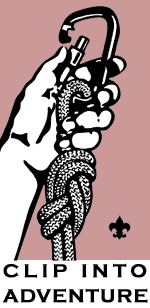Project COPE

What Is Project COPE?
Since its founding in 1910, the Boy Scouts of America has offered its members an outdoor program stressing personal fitness. Project COPE is an acronym for Challenging Outdoor Personal Experience. It comprises a series of outdoor challenges, beginning with basic group initiative games and progressing to more complicated low-course and high-course activities. Some of these events involve a group effort, whereas others test individual skills and agility. Participants climb, swing, balance, jump, and rappel as well as think through solutions to a variety of challenges. Most participants find that they can do much more than they initially thought they could.
Project COPE is an exciting outdoor activity that can attract and keep older boys in Scouting. It is designed to meet the needs of today's youth who are seeking greater challenges to their physical and mental abilities. The underlying goals of a Project COPE course are consistent with the methods of Scouting. Group activities are ideal for emphasizing the patrol method and developing leadership. Individual activities help promote personal growth.
History and Background
The 1979 Dalajamb International Encampment in Sweden provided a number of challenging events of great interest to Scouts from the United States. Foremost among them was the pioneering course constructed by a group of veteran Swedish Scouts. This course was laid out in a heavily wooded area and utilized terrain elevations as part of the design. Bridges were built across ravines of varying widths and depths. Zip lines hung for traversing the ravines, and novel constructions were used for climbing.
Successful Experiment
The National Council of the Boy Scouts of America was interested in programs, equal to the successful overseas and jamboree activities, that could be promoted on a nationwide basis. Project COPE was identified as having that potential because it offered older Scouts the kind of challenging and exciting program that encouraged them to return to summer camp and increased their tenure. An unexpected dividend was the use of Project COPE by youth and adults outside of Scouting. These groups found it an excellent tool for developing both team effort and individual achievement.
A Project COPE course provides an opportunity for each participant to achieve success as an individual and as a member of a patrol or team. The activities are not designed to be competitive or to be races against time. The objectives include building teams; solving problems; making decisions; and developing trust, communication, leadership, and self-esteem as team members cooperate to achieve goals upon which they have agreed. The course is designed to foster personal growth in a shorter length of time than anything most people have experienced.
Objectives
Before implementing a course, the council should determine what it seeks to accomplish. Seven major goals are commonly associated with Project COPE activities:
- Leadership development
- Problem solving
- Communication
- Self-esteem
- Trust
- Decision making
- Teamwork
The council should decide which activities to incorporate into its program on the basis of the desired objectives. The council should incorporate all seven objectives, giving particular emphasis to one or two. Whatever the goals, the experience should be finely tuned to accomplish them.
Safety
National promotion of Project COPE enables the Boy Scouts of America to establish standards designed to meet Scouting's needs and concerns for safety within a strong network. Each COPE facility is inspected at least twice annually—once by a regional inspection team and once by a council inspection team. The safety of Scouts, leaders, and staff is imperative. Mere concern about safety is not sufficient. This concern must be demonstrated by a director and staff members who are knowledgeable and personally skilled in the respective course activities, who are effective teachers, and who are constantly alert to safety procedures and participant needs. Prospective staff members must be carefully screened. A qualified staff must be assembled with enough members to ensure that continuation of the program does not depend on one or two people. Standards for Project COPE are stringent so that the experience will be both safe and successful.
Certification
Project COPE directors are certified through weeklong training at a National Camping School or at Philmont Scout Ranch during the annual Boy Scouting conferences. A currently certified Project COPE director must be on site whenever the COPE course is being operated. Each COPE course must be inspected annually using the national standards for Project COPE.